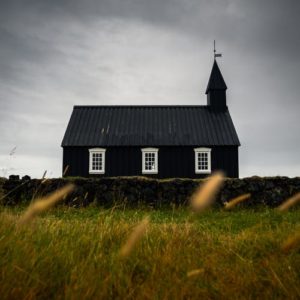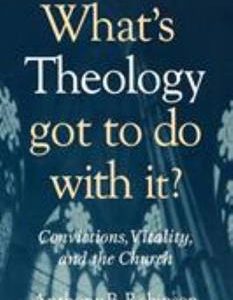Belonging and Believing, Part 2
Let me follow up on my recent post about “Belonging and Believing,” with some further observations about the relationship between the two, and how a congregation helps people come to a deep and mature faith.
 The weakness of my “start with belonging, finding a community of faith, rather than prioritizing questions of belief” proposal, is this: belonging may never move on to believing, or a deeper understanding of core Christian convictions. In this scenario people feel attachment to their particular church or congregation, but never really get into, let alone go deep into Scripture or theology.
The weakness of my “start with belonging, finding a community of faith, rather than prioritizing questions of belief” proposal, is this: belonging may never move on to believing, or a deeper understanding of core Christian convictions. In this scenario people feel attachment to their particular church or congregation, but never really get into, let alone go deep into Scripture or theology.
As a newbie minister in the latter part of the 20th century, I realized that the churches I served attracted people on the basis of the community, but didn’t have anything really to offer by way of basic faith formation. The standard move for a new member was to get them on a committee. That worked for those who had experienced some good faith formation/ teaching elsewhere and who liked being on committees. It didn’t work for those who came to us either unchurched or de-churched, which was a growing portion of people in an increasingly post-Christian, post-church America.
If someone came to us wanting, at some level, understanding of and relationship with God/ Jesus, or to learn some practices of faith, e.g. prayer, we put them on a committee that seemed to fit their skills/ interests. By and large mainline churches directed their faith formation efforts at children, and offered little for adults, particularly adults who were new to church/ faith.
This is why I have been an enthusiastic advocate for ministries that have sought to recover, for the 21st century, the “catechumenate.” That’s the name for the process/ experience by which the ancient church prepared seekers for baptism. I was introduced to such efforts by Phinney Ridge Lutheran Church in Seattle, and my friend Paul Hoffman, then lead Pastor at Phinney Ridge. They called their year-long adult faith formation experience, “The Way.”
Instead of routing new folks/ seekers to a church committee or board service, when someone asked, “Do you have something spiritual?” Phinney Ridge said, “yes,” and invited people to “The Way.”
This, I have come to feel, is the missing piece for most liberal/ mainline churches. Instead of meeting people where they are — “I’m not sure what I believe, I have lots of questions” — we were saying, “Oh, you work in finance, great, you’ll be on the Budget Committee.”
As noted, in post-Christian America, many turn to a congregation with questions and vague longings but with no church background or else a negative experience of church. Often an experience of a crisis (divorce, depression, loss) is what motivates people to turn to faith community for the first time. Apart from worship and adult education programs that assume people have the basics we got nothing for them.
As recently as last fall, when working with a congregation in British Columbia that had real vitality but felt it had “hit a plateau,” I noted many of their younger adults had little church background or faith formation. “Great that you are attracting these folks, but you’ve got to give them more than a committee assignment.”
I encouraged them to consider a, contextually appropriate, version of “The Way.” Just the other day I heard from that church. This fall they have begun such a ministry. They are thrilled to have welcomed 12 seekers who were matched with 12 sponsor in three or four small groups. The idea here isn’t to just download a ton of information. It is to build relationships, explore the questions seekers bring, and to tie it all into the rhythm of the church’s liturgical year as well as faith practices like breaking bread together and prayer.
My caution to this congregation, and all of those that have accepted my encouragement to consider such a ministry, is an adage from Alban Institute founder, Loren Mead, “Churches often put a $20 plant in a $1 hole.” (Probably needs to be adjusted for inflation.) But the point is that you have to carefully prepare the ground/ enrich the soil if you want something like “The Way” to flourish.
 So, back to “Belonging and Believing.” It’s a both/ and not, an either/ or. You may start with the community, with belonging, but build on that with a great adult faith formation experience that allows people to ask their questions, to explore biblical stories together, and to move toward the church’s sacrament of new life, baptism, and all that it entails, e.g. “baptismal living.”
So, back to “Belonging and Believing.” It’s a both/ and not, an either/ or. You may start with the community, with belonging, but build on that with a great adult faith formation experience that allows people to ask their questions, to explore biblical stories together, and to move toward the church’s sacrament of new life, baptism, and all that it entails, e.g. “baptismal living.”
For more on all this I suggest Paul Hoffman’s books, Faith Forming Faith and Faith Shaping Ministry, and Don Benedict’s book Come to the Waters. I would also suggest my book, What’s Theology Got To Do With It? Convictions, Vitality and the Church. While not about the catechumenate, it is about the core convictions of Christian faith, why they matter and the difference they make.
![Anthony B. Robinson [logo]](https://www.anthonybrobinson.com/wp-content/themes/anthonybrobinson/images/logo.png)
![Anthony B. Robinson [logo]](https://www.anthonybrobinson.com/wp-content/themes/anthonybrobinson/images/logo-print.png)